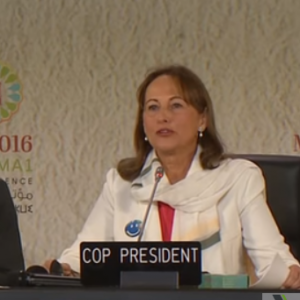How To Keep An Eye On Commodity Companies At The Marrakesh Climate Talks
The Paris Climate Agreement created a framework for reducing greenhouse gas emissions, in part by funneling money into programs that promote better management of forests, farms and fields. Negotiators will refine that agreement in Marrakesh this week and next, but it won’t mean a thing if businesses are welcomed – or cajoled – into the process, and in a big way.

7 November 2016 | MARRAKESH | Morocco | Carbon finance drove nearly $1 billion into forest conservation last year, according to Ecosystem Marketplace’s most recent “State of Forest Carbon Finance” report, which identifies more than 800 individual projects that have been funded to the tune of roughly $6 billion to-date.
It’s an impressive number – until you consider that it’s just a tad over 1% the size of the global palm sector, or 1/60th the size of the US beef sector, which doesn’t include the leather, dairy, and other components of the US cattle sector. It also pales compared to the money going into soy, as well as into timber & pulp sectors.
Together, these “big four” commodities are responsible for most of the world’s deforestation, according to research by Ecosystem Marketplace publisher Forest Trends. That makes them key to fixing the climate mess, because agriculture and deforestation generate nearly 25% of global greenhouse-gas emissions, mostly to feed our ravenous appetite for burgers, buns, beef, and pretty much everything else we buy, burn, or burry.
Earlier today, Gustavo Silva-Chávez, who runs the REDDX carbon-finance tracking initiative, offered a look ahead into the issues negotiators will be wrestling with in the next two weeks, but buzzing around those negotiations is an entire constellation of activities designed to slow climate change by overhauling the agricultural sector.
That, however, can’t happen unless we overhaul the global supply chains that feed the massive combines that create the products that we buy to feed ourselves, and this year much if not most of our coverage will focus on efforts to welcome, lure, cajole – and, yes, even shame – companies into carrying their share of the load, which ultimately is our load as well.
The Private Sector Emerges
Major companies like Unilever, Marks & Spencer, and Danone made their presence known in the Paris talks last year by launching global initiatives that have the potential to transform supply chains well beyond their own networks – although they remain the exceptions that prove the rule.
This year, we’ll be following up on those initiatives, expanding into others, and trying to get a feel for which companies are leading on the climate front, which are ascending, and which are slacking off.
Evolving Articles
Because some stories will be revealing themselves incrementally over the course of the week, we’ll be covering some of them like slow-motion breaking stories: with a live blog that continuously updates, and a core story that’s continuously being rewritten over the course of the week. If you want to follow stories as they’re updated, you’ll be able to receive e-mail updates whenever substantial updates are made.
Bionic Planet Podcast
We’ll also be providing frequent – and maybe even daily – editions of the Bionic Planet podcast, which is available on iTunes, TuneIn, Stitcher, and here:
Here’s a run-down of the stories we’ll definitely be following this week.
Aviation
All this week and probably into next, we’ll be following the evolution of “CORSIA”, which is the International Civil Aviation Organization’s (ICAO) new market-based mechanism.
The Verified Carbon Standard (VCS) will be offering details on their proposals tomorrow, and we will create a stub of a story that will grow and evolve – much as a Wikipedia entry does – over the course of next two weeks.
Transparency for Sustainable Economies
Another story to fit that mold is the launch of TRACE, which stands for “Transparency for Sustainable Economies”. It’s an online tool being developed by the Global Canopy Programme and the Stockholm Environment Institute. It’s designed to shine a light on global supply chains in a way that will help both companies and NGOs identify the environmental impact of commodities sourced from different areas.
We’ll post a stub on Wednesday, and update it over the course of the week.
Unilever and Marks & Spencer Commodity Sourcing Push
One highlight of last year’s talks was the commitment by Marks & Spencer and Unilever to source commodities from jurisdictions that slash their deforestation rates. They’ll be offering a one-year summary on Wednesday, and this promises to be a fascinating and important story.
REDD Acceleration Fund
And one more story we’ll definitely be following this week are proposals to create a “REDD Acceleration Fund”, which is a proposed financing mechanism that aims to provide public-sector risk-sharing for existing REDD projects.
Check back next Monday for a recap of this week and a preview of the week ahead, or sign up above to receive e-mail updates whenever
Please see our Reprint Guidelines for details on republishing our articles.

